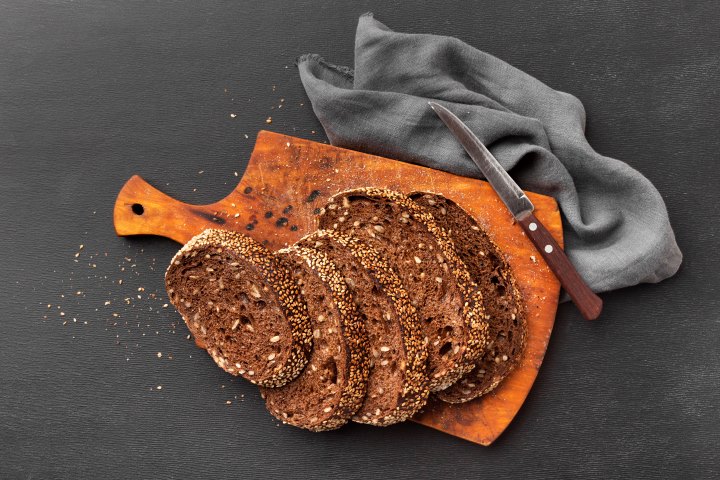In today’s health-conscious world, the quest for nutritious and wholesome foods has led people to explore ancient recipes and traditional practices. Among these rediscoveries is Ezekiel bread, a type of bread with roots dating back to biblical times. This unique bread is known for its distinctive ingredients and preparation methods, boasting a plethora of health benefits while also raising concerns about potential side effects. In this blog, we delve into the fascinating world of Ezekiel bread, exploring its benefits, side effects, and nutritional value.
A Brief History of Ezekiel Bread
Ezekiel bread takes its name from the Old Testament book of Ezekiel, where it is mentioned as a bread made with various grains and legumes. The recipe’s foundation is in the verse: “Take wheat and barley, beans and lentils, millet and spelt; put them in a storage jar and use them to make bread for yourself” (Ezekiel 4:9). This biblical reference has inspired modern-day bakers to create a bread that captures the essence of nutrition and wholesomeness.
Ingredients and Preparation
Ezekiel bread stands out for its unique combination of sprouted grains and legumes. The typical ingredients include organic sprouted wheat, sprouted barley, sprouted millet, sprouted lentils, sprouted soybeans, and sprouted spelt. The grains and legumes are allowed to germinate or sprout before being ground into flour and mixed to create the dough.
The sprouting process is thought to enhance the bread’s nutritional value. Sprouting breaks down antinutrients like phytic acid, which can hinder the absorption of minerals, and activates enzymes that aid digestion. Additionally, sprouting may increase the availability of certain nutrients, making Ezekiel bread more nutrient-dense than conventional bread.
After the sprouted grains and legumes are mixed, the dough is shaped into loaves and baked at a low temperature to preserve the nutrients. Most commercially available Ezekiel bread is made without added sugar, preservatives, or artificial ingredients, making it a wholesome and natural choice for health-conscious consumers.
Health Benefits of Ezekiel Bread
Ezekiel bread’s nutritional profile is one of its most significant selling points. Due to its combination of sprouted grains and legumes, it offers a variety of essential nutrients:
Protein-Rich:
The blend of grains and legumes in Ezekiel bread results in a complete protein profile. This means it contains all nine essential amino acids that the human body cannot produce on its own. For vegetarians and vegans, Ezekiel bread can be a valuable source of protein in their diets.
Increased Nutrient Absorption:
The sprouting process in Ezekiel bread reduces phytic acid content, which can interfere with the absorption of essential minerals like iron, zinc, and calcium. With lower phytic acid levels, the body can better absorb these vital nutrients from the bread.
Rich in Fiber:
Ezekiel bread is a good source of dietary fiber, aiding in digestion and promoting a feeling of fullness. The fiber content can also help stabilize blood sugar levels, making it a suitable option for individuals with diabetes or those aiming to maintain steady energy throughout the day.
Low Glycemic Index:
Thanks to its fiber content and the combination of grains and legumes, Ezekiel bread has a lower glycemic index compared to many conventional bread varieties. A low glycemic index means that it causes a slower and more gradual increase in blood sugar levels, offering potential benefits for managing diabetes and weight control.
Micronutrients:
Ezekiel bread contains various vitamins and minerals, such as B vitamins, vitamin E, magnesium, potassium, and phosphorus. These micronutrients play essential roles in various bodily functions, supporting overall health and well-being.
Potential Side Effects of Ezekiel Bread
While Ezekiel bread boasts many nutritional benefits, it’s essential to consider potential side effects:
Allergies and Sensitivities:
Some individuals may be allergic or sensitive to specific grains or legumes present in Ezekiel bread, such as wheat or soy. Allergic reactions can range from mild discomfort to severe symptoms. Anyone with known food allergies or sensitivities should exercise caution and consult a healthcare professional before adding Ezekiel bread to their diet.
Flatulence and Digestive Discomfort:
The high fiber content of Ezekiel bread can cause flatulence and digestive discomfort in some individuals, particularly if they are not accustomed to consuming significant amounts of fiber. Gradually introducing the bread into the diet and drinking plenty of water can help mitigate these effects.
Gluten Content:
While Ezekiel bread is made from sprouted grains, it may still contain gluten from wheat, barley, or spelt. Individuals with celiac disease or gluten sensitivity should avoid Ezekiel bread or choose gluten-free alternatives.
Incorporating Ezekiel Bread into Your Diet
If you decide to incorporate Ezekiel bread into your diet, consider these tips:
- Check the Ingredients: Read the labels carefully to ensure the bread is made from sprouted grains and legumes without added sugars or artificial ingredients.
- Portion Control: While Ezekiel bread is nutritious, moderation is key. It still contains calories and carbohydrates, so be mindful of portion sizes, especially if you are watching your calorie intake or managing blood sugar levels.
- Experiment with Toppings: Ezekiel bread has a distinct nutty flavor that pairs well with various toppings. Get creative and try avocado, hummus, nut butter, or fresh vegetables to add extra nutrients and taste.
- Combine with a Balanced Diet: Ezekiel bread can be part of a well-rounded diet rich in fruits, vegetables, lean proteins, and healthy fats. Variety is key to obtaining a broad range of nutrients.
Conclusion
Ezekiel bread, with its ancient origins and sprouted grains and legumes, offers a unique nutritional profile that sets it apart from conventional bread. The abundance of complete proteins, fiber, and essential micronutrients make it a valuable addition to a balanced diet. However, as with any food, individual tolerances and dietary requirements should be considered. For those without allergies or sensitivities, incorporating Ezekiel bread mindfully can be a step towards embracing the wholesome goodness of ancient grains and promoting overall well-being. Remember, it’s always a good idea to consult with a healthcare professional or registered dietitian before making significant changes to your diet to ensure it aligns with your specific health goals and needs. Happy and healthy eating!
Resources:
https://www.ncbi.nlm.nih.gov/pmc/articles/PMC6413227/













